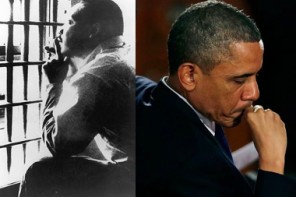First, Harry Reid cited an unnamed source who claimed that Mitt Romney paid no taxes for a decade. Then, he invoked the ghost of George Romney in an effort to shame the presidential candidate into releasing his returns.
Then, Mitt Romney told Harry Reid to “put up or shut up.”
Then, the Chair of the RNC called the Senate Majority Leader “a dirty liar.”
Then, Harry Reid’s chief of staff called the Republicans “henchmen” and “cowards” for avoiding the original question of the unreleased returns.
And all the while, David Axelrod sat back and smiled and ate pie.
It’s silliness, really—shameful, maybe—that an already unpleasant campaign 2012 has gone down this particularly unpleasant path. And the protagonists of this drama? Both Mormons.
Throughout the campaign, observers have linked Romney’s communications and conflict-management style to his privileged upbringing in a storied multigenerational Mormon family, his immersion in church service from the time he was a young man, and to his deep embeddedness within the Mormon elite.
In an otherwise petulant (and sometimes downright nasty) article about Governor Romney this month at GQ, Wells Tower had this cogent insight:
He isn’t ever truly comfortable around people he considers outsiders and is most at ease with fellow members of his faith. That is, he seems to divide the world into two groups: his in-group and the suspicious, hostile world at large with whom it is dangerous to be too honest. Which perhaps is fine when it comes to matters of Mormonism, but I’d aver that this ethos creeps into his political discourse, too. A rather disquieting example is Romney’s recent quote that politicians should only discuss matters like income inequality ‘in quiet rooms,’ not within earshot of the rabble to whom the issue matters most direly.
Romney’s style is highly managed, insider-privileged, and public conflict averse, mirroring the personality of the corporate LDS Church management. Romney does not like to be challenged, especially on matters of personal integrity, and when he is, he becomes publicly irritated and petulant.
Harry Reid, on the other hand, couldn’t care less. As reported in this vivid profile at The New Yorker, Reid grew up in a house built from railroad ties in the mining town of Searchlight, Nevada. His father was a gold miner with an elementary-school education, a drinker and a brawler, who killed himself when he was 58; his mother was a laundress. Reid attended school in a two-room cinderblock building. There was no schooling beyond eighth grade in Searchlight, so he hitchhiked an hour to get his high school diploma. He went on a boxing scholarship to the College of Southern Utah, where he and his future wife Landra Gould (who was raised Jewish) joined the Church of Jesus Christ of Latter-day Saints. Harry Reid almost came to blows with his Jewish father-in-law to win the hand of his wife. He faced the mafia head-on in his four years as head of the Nevada Gaming Comission. Once, he reportedly choked a mobster who tried to bribe him, and his family’s station wagon was sabotaged with a bomb.
Harry Reid is not averse to conflict. In fact, he has an iron jaw.
Within Mormonism, there are class divides, and status divides, and regional differences, and cultural differences between converts like Reid and elite multigenerational ethnic Mormons like Romney.
But rarely have these differences been so heatedly on display.
The Mormon moment! Behold: our humanity.


